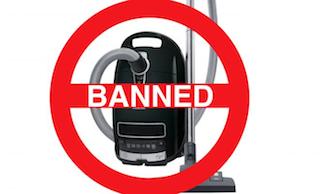The EU have been busying themselves with the important issues again. According to regulations, the maximum power of a domestic vacuum cleaner will be capped at 1600W from September 2014 and 900W from 2017 (http://eur-lex.europa.eu/LexUriServ/LexUriServ.do?uri=OJ:L:2013:192:0024:0034:EN:PDF). We're told that this will save 19TWh (that's 19,000,000,000,000 units of electricity) by 2020. That's an awful lot: so much, in fact, that it sounds a little fishy to me. Let's check their maths.
First, a few assumptions:-
- There are 213,839,200 households in the EU (this isn't really an assumption...I looked it up: http://appsso.eurostat.ec.europa.eu/nui/show.do?dataset=lfst_hhnhtych&lang=en)
- Each of these households spends an hour a week vacuuming, on average (don't we all ?!). This figure isn't pulled completely out of the air: the 2014-2017 part of the new regulation states that the total annual power consumption of a new vacuum cleaner should be no more than 62.5KWh and that the rated input power should be no more than 1600W. Divide the first by the second and you find that our EU masters expect us to spend 39 hours per year - equivalent to 0.75 hours per week. vacuuming. Interestingly, after 2017 the total annual consumption cap drops to 43KWh and the maximum rated input power drops to 900W. Do the same maths and you'll find that we will be vacuuming for 47.7 hours per year (almost an hour a week) from 2017. That's progress, I guess. Anyway, an hour per week per household is a nice conservative figure for our purposes here.
- The average vacuum cleaner currently in use uses 1800W of power. Again, I didn't make this figure up: it is taken from a post on the European Commission blog
- The expected life of a vacuum cleaner is 10 years. Once again, I didn't pull this figure out of thin-air. The regulation states "operational motor lifetime shall be greater than or equal to 500 hours". At an hour a week (see earlier assumption), that's about 10 years. That feels about right to me. So we can expect that 10% of the households in Europe will purchase a new vacuum cleaner each year, swapping their power-hungry 1800W unit for a more eco-friendly 1600W unit up until 2017 and for a positively tree-hugging 900W unit thereafter
So how much power will all these neat-freaks with their vacuum cleaners wind up using and how much will be saved with the new regulations ?
2015
|
2016
|
2017
|
2018
|
2019
|
2020
| |
| With No Change (MW) |
20,015,349
|
20,015,349
|
20,015,349
|
20,015,349
|
20,015,349
|
20,015,349
|
| Under New Regulations (MW) |
19,792,956
|
19,570,564
|
19,348,171
|
18,347,403
|
17,346,636
|
15,345,101
|
| Saving (MW) |
222,393
|
444,786
|
667,178
|
1,667,946
|
2,668,713
|
4,670,248
|
So by my calculations, by 2020 the new regulations will result in a saving 4.7TWh per year (at most). That's an awful lot less than the claimed figure of 19TWh. Actually, 19TWh is only slightly less than the total power that we use vacuuming each year using our current cleaners, so its difficult to see how any change to regulations - short of banning vacuum cleaners completely - could result in a 19TWh saving.
Am I missing something? If I am, I just can't see it.
